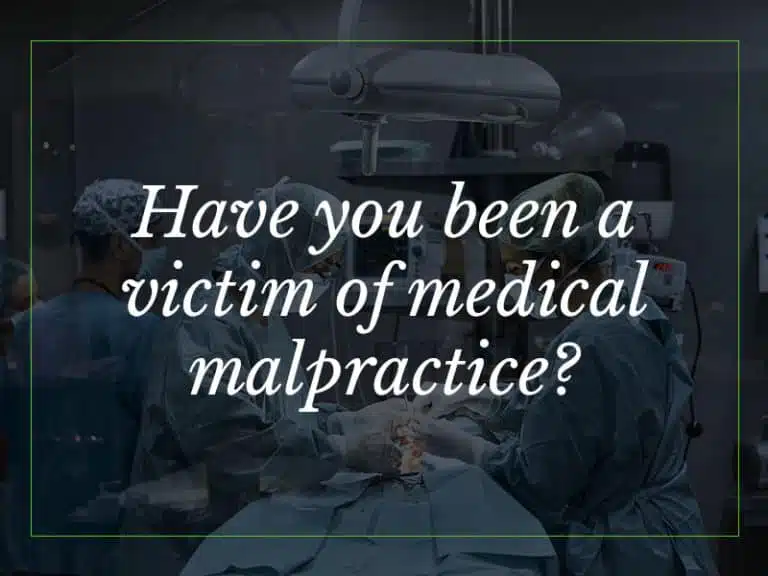Florida Medical Malpractice Attorneys
You trust doctors and hospitals to take care of you and provide the right treatment. When that trust is breached and you suffer significant harm because of a doctor’s or medical professional’s negligence, it can be devastating.
Medical errors are the third leading cause of death in the country, behind only heart disease and cancer.
Home » Florida Personal Injury Lawyers » Florida Medical Malpractice Attorneys
Have you or a loved one been injured as the result of Medical Malpractice?
If you are injured as a result of the negligence of a healthcare provider, you are entitled to recover damages for medical malpractice. This refers to both intentional and unintentional negligence or care that fell below the industry standard. Some of the scenarios that constitute medical malpractice in include:
- Wrongful death during any medical procedure
- Incorrect medical treatment or failure to provide treatment
- Misdiagnosis or failure to diagnose
- Harm or injury caused during surgery or other medical procedure
- Injury to a patient or infant during childbirth
- Pharmacy or medication errors – ether prescribing or dispensing
- Any health care provider can be the subject of a lawsuit for medical malpractice in Florida. This includes doctors, nurses, psychologists, hospitals, medical clinics, and medical groups.
If you or someone you care about has been injured as a result of medical negligence or a physician error, you can – and should – seek justice. Call our Florida medical malpractice attorneys at Farah & Farah today for a free case review.
Who Can Be Sued For Medical Malpractice?
Most people think medical malpractice claims can only be brought against medical doctors, but that is not true. Medical malpractice liability is not limited strictly to medical doctors, any medical professional that has a duty to provide a standard of care to you can be held responsible for malpractice including:
Doctors, Nurses and Other Healthcare Professionals
Doctors, surgeons, nurses, and other healthcare professionals, including dentists, psychiatrists, physician assistants, and chiropractors, may be held liable for medical malpractice. In any case, an attorney must prove that the healthcare provider failed their duty to provide standard care and the resulting actions caused the plaintiff harm or injury.
Hospitals
Hospitals may be held responsible for the actions of their employees through vicarious liability. For instance, if the hospital did not operate an adequate setting for its employees to deliver proper medical care, they may be accountable for medical malpractice.
Direct Hospital Negligence
Hospitals are liable under the corporate negligence doctrine to conduct thorough screenings of all employees, investigate credentials, and provide sufficient training if applicable to staff. For example, if a hospital hires a surgeon with falsified credentials, and the incompetent employee harms a patient, the hospital can be held responsible.
Additionally, a hospital must have sufficient registered nursing at all times to provide appropriate patient care. The hospital must also oversee their physicians’ treatment plans and decide if the treatment plan is not adequate. Hospitals must also perform clinical tests, update medical records, treat seriously ill or injured patients in emergency settings. Federal and state statutes also require hospitals to treat all potential patients regardless of race, religion, or inability to pay for treatment.
Why Hiring a Medical Malpractice Lawyer is Beneficial
It’s important to have an attorney who understands the medical industry and insurance process on your side to make sure you’re not on the hook for your doctor or physician’s mistake. At Farah & Farah, our injury attorneys throughout Florida have the resources needed to take on doctors, hospitals, and insurance companies, letting you focus on your recovery.
Recovering the medical malpractice benefits you’re entitled to is a time-consuming process. Hiring an attorney can help you streamline your claim. The team at Farah & Farah has direct experience with nursing home abuse, birth injuries, surgical errors, defective medical devices, dental malpractice, and more. Our attorneys know how the law works, and they are ready to fight for you.
Most health care providers have deep pockets and will have experienced defense attorneys at their disposal, so you must have a skilled, experienced medical malpractice team to present your case. Many of these providers are unwilling to admit their wrongdoing. A skilled medical malpractice lawyer will help you cut through their legalese and get results. Farah and Farah will guide your case, providing:
- A thorough consultation that gets the facts of your story to create a strong case
- Gather and secure crucial evidence for your case, including testimony from medical expert testimony that demonstrates negligence
- Appointments with physicians to help guide your recovery
- Develop a game plan for your case with the maximum amount of compensation
- Negotiate medical expenses
- Fighting for your best interests
Farah & Farah attorneys work on a contingency basis. That means they do not get paid unless you win your case. Our personal injury medical malpractice attorneys have the resources needed to take on doctors, hospitals, and insurance companies, letting you focus on your recovery.

What to Expect From Farah & Farah’s Medical Malpractice Attorneys
Your case is about more than financial relief – it’s about your health and getting back to life before your injury. At Farah & Farah, we understand what you are going through and can help you hold the negligent parties accountable.
Our medical malpractice attorneys have the legal experience and resources to take on even the biggest companies in the medical industry. We will:
- Investigate your claim to discover if medical malpractice has taken place
- Find the medical experts who can explain what happened and provide testimony and evidence to prove that your previous provider was negligent
- Help you find a different doctor who can help you recover from your injuries
- Work toward getting you the maximum amount possible from a medical malpractice claim
- Cover the costs of a potentially lengthy and expensive legal battle
Regardless of the circumstance you are in, our medical negligence attorneys will treat you with the utmost dignity and respect. You won’t have any upfront costs and only pay if your case is won or settled.
Get Legal Assistance With Your Medical Malpractice Case
If you believe you’ve been injured as a result of medical malpractice, we are here to help. Our medical negligence lawyers have a track record for collecting millions of dollars in compensation for our clients. Past settlements include:
$275 THOUSAND NURSING HOME ABUSE
A nursing home resident was not given proper heel protection or monitoring by the staff.
$450 THOUSAND NURSING HOME ABUSE
A nursing home resident developed bed sores due to inadequate treatment.
$5 MILLION MEDICAL MALPRACTICE
Against the hospital. Brain injury was sustained while a patient was in the ER.
What Are The Most Common Types of Medical Malpractice?
All forms of medical malpractice can be traumatic to the patients who are impacted, but it’s also important to understand the different types you could encounter. To proceed with a case, one of the first steps will be to determine exactly what happened and how to categorize the incident. The most common types of medical malpractice include:
Hospital Malpractice
Hospitals should be a place where those suffering from injury or illness can receive necessary and vital care. For some patients, unfortunately, hospitals can become the site of further harm. When hospitals cause injury or illness as a result of their negligent or inappropriate care, we call that “hospital malpractice.” This term covers any improper action by a hospital staff member, including doctors, nurses, technicians, pharmacists, and admitting staff.
Nursing Home Abuse or Neglect
Nursing home abuse and nursing home neglect are similar in a lot of ways, but there is an important distinction between the two. Nursing home abuse describes incidents where the staff intentionally acted to harm a resident or knew their actions had the potential to cause harm. Nursing home neglect covers incidents where a nursing home resident does not receive an adequate and reasonable standard of care.
Dental Malpractice
Dental malpractice cases are closely related to medical malpractice cases, except the former focuses exclusively on incidents related to dental work. When a dentist offers substandard care that leads to injuries or other health issues, they may be liable for the harm they caused.
Cerebral Palsy
Cerebral palsy is a brain injury that can occur during pregnancy and childbirth. Sometimes, it can be caused due to medical negligence. For example, if a doctor does not respond appropriately to the presence of jaundice, high blood pressure, or toxemia in a mother, then her child may be born with cerebral palsy.
Birth Injury
Birth injury is a form of medical malpractice that involves negligent harm caused to a fetus or newborn during pre- or post-natal testing or the labor process. Doctors and medical staff are trained to react to a number of potential emergencies or sub-optimal birthing conditions, and failure to respond appropriately during these situations can rise to the level of malpractice.
What Types of Actions Can Constitute Medical Malpractice?
Medical malpractice can occur when:
- A medical professional improperly treats or fails to treat a patient
- A medical professional fails to properly diagnose a condition
- A medical professional fails to properly follow up with a patient
- A medical professional prescribes incorrect or inappropriate medications
Negligence such as the types identified above can occur in office visits, emergency room care, surgery, pre- or post-operative treatment, therapeutic treatment, and others.
This negligence can be represented by many different types of actions (or inaction), but it’s also important to understand that simply making a mistake does not automatically make a medical professional liable for malpractice. A qualified malpractice case must establish that a specific standard of care was breached. Actions that would fall under that umbrella include:
Improper Administration of Anesthesia
If you undergo any surgery, there’s a very good chance you will be given anesthesia. Anesthesia is a chemical substance that is used to render patients unconscious during surgery. The incorrect administration of anesthesia can lead to a variety of nightmarish scenarios. For example, you could be semi-paralyzed by the anesthetic agent, where you still feel the surgical incisions but are unable to speak or move. In this case, the surgical staff are expected to ensure that you are fully unconscious during a surgical procedure, so they have breached a standard of care.
Hospital Management Failing to Provide a Patient-Friendly Environment
From maintaining a clean environment to thoroughly evaluating prospective employees, hospitals have a duty to keep their admitted patients safe. If an inadequate vetting process leads a hospital to hire an under-qualified surgeon, doctor, nurse, or other staffer, then they may be liable for any harm caused by that staffer. That includes the improper administration of medications, unreasonably inaccurate diagnoses, and many other actions.
Misdiagnosis or Delayed Diagnosis
When you visit a doctor, there is an expectation that you will receive a comprehensive, accurate, and timely diagnosis of your medical issues. But that’s not always the case. Sometimes, medical professionals may miss important symptoms or misinterpret critical test results. This can mean that your serious condition goes untreated, or you receive treatment for the wrong condition.
Cancers of the lung, breast, and ovaries are some of the most commonly misdiagnosed illnesses. To pursue a qualified case, patients must prove that another medical professional in a similar practice would have likely made the correct initial diagnosis. Patients must also demonstrate that their condition has worsened as a result of the incorrect or delayed diagnosis of cancer.
Emergency Room Malpractice
As the name suggests, emergency rooms are fast-paced, high-stress environments for both medical professionals and patients. In times of crisis, these vulnerable patients are especially reliant on healthcare workers to provide well-informed, skillful, and timely care.
Meanwhile, emergency room employees face a lot of pressure to keep patients moving through their department as quickly as possible. Given these intense and risky circumstances, patients are at greater risk of suffering from an emergency room error. This can take the form of diagnostic or medication-related errors, failures to order the correct tests or identify crucial symptoms, and a host of other errors.
Surgical Malpractice
Surgeons are the most likely among healthcare employees to face a charge of medical malpractice. The potential for lifelong damage is often higher with surgical errors, which can include performing the wrong procedure(s), operating on the wrong area(s) of the body, or improperly administering anesthesia.
While surgeons carry out many complex procedures, we expect their extensive education and training to guide them toward making the correct decisions and calculations. But all-too-often, we see critical errors involving poorly sanitized or defective equipment, organ punctures, failure to provide necessary patient education, and a host of other issues that can lead to malpractice claims.
Medical Device Errors
Many patients, especially the elderly and those with chronic illness, rely on medical devices to help identify, treat, and manage their health issues. This reliance can be temporary in some cases, while other situations require long-term or ongoing use of a medical device.
Unfortunately, these devices can be subject to manufacturing errors, design errors, or sometimes include inadequate warnings. These errors can be life threatening or lead to a long-term diminishment of your quality of life. It’s also important to note that sometimes the product manufacturer may be the liable party – not your doctor.
Failure to Treat
Sometimes, doctors may be unaware of or forget to tell you about a treatment that could help you. In certain cases, this failure to treat can cause your medical condition to get worse, and it could be grounds for a medical malpractice case.
What is “medical malpractice”?
Medical malpractice is the failure of a health care provider, usually a doctor, to provide a patient with treatment equal to the customary standard of care in the medical industry. To proceed with a malpractice lawsuit, our medical negligence attorneys must prove that this failure resulted in an injury to the patient.
What does “customary standard of care” mean?
This phrase refers to whether your doctor has exercised the same degree of care and skill as the average qualified doctor presented with the same or similar circumstances as your case.
Is it medical negligence if my treatment did not yield the result the doctor told me it would or that I thought it would?
Not necessarily. A bad outcome isn’t medical negligence unless it was caused by the doctor’s failure to exercise the degree of care and skill of a qualified physician. At Farah & Farah, our medical negligence lawyers work with physicians to evaluate potential medical malpractice claims. Contact our firm and we will examine your medical records to determine if medical malpractice may have occurred.
How do I know if I have a medical negligence case?
If you suspect your doctor didn’t treat you as skillfully, or with the same knowledge as the average qualified doctor would have under the circumstances, you may have a medical negligence claim. However, you must have been injured or harmed in some way as a result of the medical negligence in order to file a lawsuit.
If I believe that I have been harmed by medical malpractice, what should I do?
Call Farah & Farah now. Our medical negligence attorneys will help you determine whether you have a claim worth pursuing in a court of law.
How do you determine if the doctor has failed to follow the customary standard of care?
We hire a doctor experienced in the area of medicine of your claim. This expert doctor will review your medical records and examine you to evaluate your medical malpractice case. The doctor will then advise our medical malpractice lawyers as to whether the standard of care has been breached and whether you have been harmed as a result.
Will my medical malpractice case go to trial?
It depends. In years past, valid claims were settled without the need for a trial. Recently, most physicians have seen the legal system being abused by plaintiffs and have been less likely to settle. Regardless, you can be confident that at our firm, the team of medical negligence attorneys and support staff are always prepared to go to trial.
How long do most medical negligence cases last?
The time it takes to resolve your medical negligence case will depend on the facts involved in your lawsuit. From the time the medical malpractice lawsuit was filed, medical malpractice cases will take an average of one to two years to reach a resolution.
What should I do if the hospital has already asked about a settlement?
Contact Farah & Farah immediately. Without the advice of our medical malpractice lawyers, you have no idea what your case is worth and you could be settling for far less than you deserve. Chances are if the hospital seeks a settlement, it’s because they know their mistake could cost them big if taken to trial.
Florida Medical Malpractice Stats
Florida has one of the highest frequency of medical malpractice in the nation. Because there is such a high population of patients and doctors in Florida, there is more opportunity for mistakes.
Payments Made to Patients in Florida Medical Malpractice Claims
In 2018, the combined award total for medical malpractice claims was $299.46 million. This figure accounts for 948 medical malpractice claims, with 302 payments in the range of $250,000 to $499,000. Other than wrongful death, the top cause of injury settlement claims include injuries that require lifelong care.
Adverse Actions Reported for Florida Physicians Due to Medical Malpractice Claims
Adverse actions include any official negative action — such as censure, sanctions, reprimands — taken against a doctor due to incompetent or negligent acts. In 2018 alone, 41 physicians in Florida lost clinical privilege as a result of their negligence. Twenty-eight of these cases involved the Drug Enforcement Administration (DEA).
Medical Malpractice Claims are Decreasing Over Time
It is an uphill battle to get a fair settlement. The win-rate for plaintiffs is 23%, far lower than other personal injury cases, which run about 59%. Medical malpractice trials are more likely to have a jury trial, averaging a mean length of 5 days in court — however, awards for medical malpractice average 17 times higher than other types of tort jury trials.

Have you or a loved one been injured as the result of Medical Malpractice?
Who Can Be Sued For Medical Malpractice?
Why Hiring a Medical Malpractice Lawyer is Beneficial
What to Expect From Farah & Farah’s Medical Malpractice Attorneys
Get Legal Assistance With Your Medical Malpractice Case
What Are The Most Common Types of Medical Malpractice?
What Types of Actions Can Constitute Medical Malpractice?
What is “medical malpractice”?
What does “customary standard of care” mean?
How do I know if I have a medical negligence case?
If I believe that I have been harmed by medical malpractice, what should I do?
How do you determine if the doctor has failed to follow the customary standard of care?
Will my medical malpractice case go to trial?
How long do most medical negligence cases last?
What should I do if the hospital has already asked about a settlement?
free case review
Client Testimonials


YOU AND YOUR FAMILY

Related Blogs













